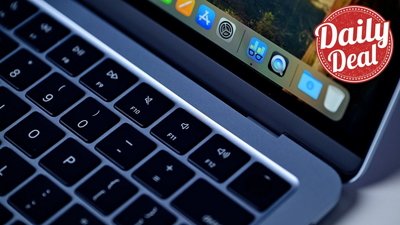Intel's Pat Gelsinger says that the company hopes to win back Apple's business, but it will need to create a better chip than Apple Silicon to do it.
As Apple prepares to announce the next devices in its transition to Apple Silicon, the CEO of Intel says that he will never give up hope that Macs will return to using his processors.
Speaking to Axios, CEO Pat Gelsinger did also say that he would "never give up on the idea of anything not running on Intel chips." But specifically for the Mac, Gelsinger said that it will take doing better than Apple can before they can convince Tim Cook to switch back.
"Apple decided they could do a better chip themselves than we could," he said. "And, you know, they did a pretty good job. So what I have to do is create a better chip than they can do themselves."
"I would hope to win back this piece of their business," he continued, "as well as many other pieces of business, over time."
"In the meantime, I gotta make sure that our products are better than theirs, that my ecosystem is more open and vibrant than theirs, and we create more compelling reason for developers and users to land on Intel-based products," said Gelsinger.
"So I'm gonna fight hard to win Tim's business in this area," he concluded.
Apple announced its transition away from Intel at WWDC in 2020. Since then, Intel has said it wants to manufacture Apple Silicon. In now multiple mocked ad campaigns, it has also hired the former "I'm a Mac" actor Justin Long to extol Windows, and tried to convert Mac fans in a "social experiment."
 William Gallagher
William Gallagher








 Malcolm Owen
Malcolm Owen


 Wesley Hilliard
Wesley Hilliard



 Christine McKee
Christine McKee




-m.jpg)




55 Comments
These words may backfire on him if they are unsuccessful in creating a better chip.
? I know three engineers who work for Intel, one of them complained to me for years that the only solution was adding more capacitors which adds more heat. All of this was true but Apples approach wins out because the engineers I talked to at Intel didn’t see a way forward and now the CEO knows today that they’re going to be destroyed by these new chips, obliterated is a more correct term to use…
Apple's strategy has been vertical integration by controlling all key aspects of the software and hardware stack. This isn't possible with CPUs that have to be designed with all eventual use cases in mind. Product cycles (initial planning to rollout) are extremely long, leaving Apple with little control over the end product. Reversing this must have been a strong incentive to Apple when making the final decision to take this inhouse.
Getting there took Apple many years of due diligence, prototypes and validation. It is not going to be reversed on the grounds of potential faster CPUs / more power-efficient CPUs if control has to be sacrificed for good. And this scenario would not materialize unless Intel executes on their claims of regaining process leadership. If they do, Apple could easily adopt Intel's foundry service, resulting in a much more probable win / win for both companies. Intel's Foundry services are open to competing architectures such as ARM and RISC V even today.